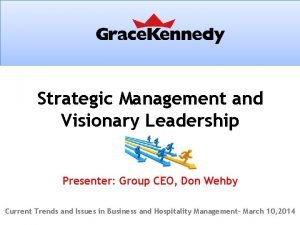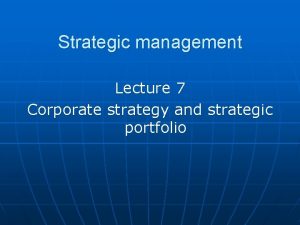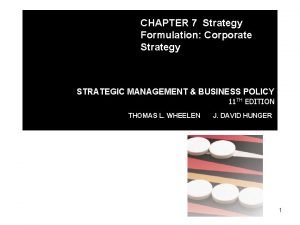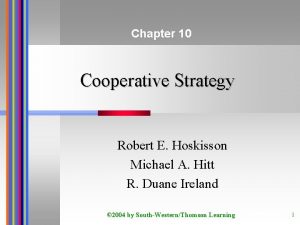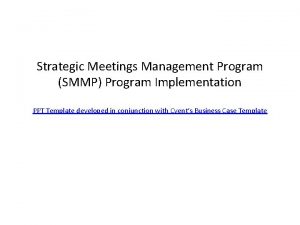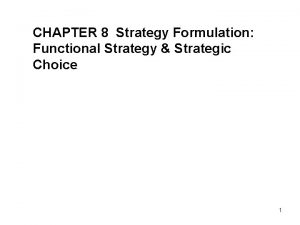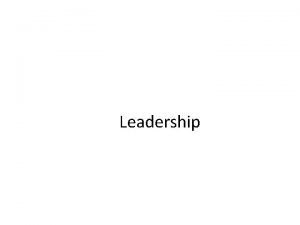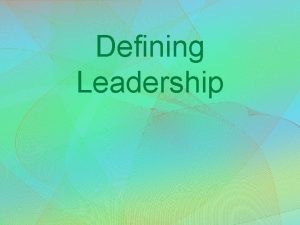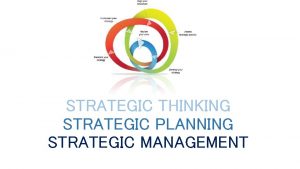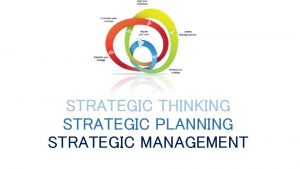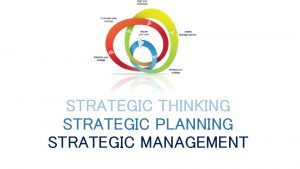Strategic management Chapter1 Strategic Leadership Managing the strategy












- Slides: 12

Strategic management Chapter-1 Strategic Leadership: Managing the strategy making process for competitive Advantage

Learning objectives 1. Outline the cognitive biases that might lead to poor strategic decisions, and explain how these biases can be overcome. 2. Discuss the role strategy leaders play in the strategymaking process. 2

Strategy implementation and feedback loop Strategy implementation üTaking action at the functional, business, and corporate levels to execute a strategic plan üDesigning the best organization structure, culture, and control systems to put a chosen strategy into action Feedback loop - Provide information to the corporate level on the: üStrategic goals that are being achieved. üDegree of competitive advantage being created and sustained.

Criticisms of formal planning models • Unforeseen circumstances can adversely affect strategic plans. • Excessive importance is attached to the role of top management. üWhile ignoring lower-level managers. • Many successful strategies are a result of serendipity rather than strategic planning.

Emergent and deliberate strategies

Scenario planning

Continued • Formulating plans that are based on “what-if” scenarios about the future. • Encourages managers to: üThink outside the box and be more flexible üAnticipate probable scenarios • Ivory tower planning - Recognizes that successful strategic planning encompasses managers at all levels of the corporation. 7

Cognitive biases and strategic decision making Cognitive biases ü Systematic errors in human decision making. ü Arise from the way people process information. Prior hypothesis bias ü Decisions are made based on prior beliefs, even when evidence proves that those beliefs are wrong. Escalating commitment ü Decision makers, having committed significant resources to a project, commit even more, despite receiving feedback that the project is failing. Reasoning analogy ü Use of simple analogies to make sense out of a complex problem.

Cognitive biases and strategic decision making Representativeness ü Tendency to generalize from a small sample or a single vivid anecdote. ü Violates the statistical law of large numbers. Illusion of control ü Tendency to overestimates one’s ability to control events ü General or top managers are more prone to this. Availability error ü Arises from our predisposition to estimate the probability of an outcome based on how easy it is to imagine it.

Techniques for improving decision making Devil’s advocacy ü A member of a decision-making team identifies all the considerations that might make a proposal unacceptable. ü Possible perils of recommended courses of action are brought into light. Dialectic inquiry ü Generation of a plan and a counter-plan that reflect plausible but conflicting courses of action. ü Promotes strategic thinking. Outside view ü Identification of past successful or failed strategic initiatives to determine if they will work for the current project.

Characteristics of good strategic leaders üVision, eloquence, and consistency üArticulation of a business model üCommitment üBeing well informed üWillingness to delegate and empower üAstute use of power üEmotional intelligence v. Self-awareness, self-regulation, and motivation v. Empathy and social skills

Thank you for you nice cooperation Any Question? ? ?
 Chapter one of mice and men
Chapter one of mice and men Revelation chapter 1 summary
Revelation chapter 1 summary Dmd chapter1
Dmd chapter1 Visionary leadership and strategic management
Visionary leadership and strategic management Meredith and mantel three stage model
Meredith and mantel three stage model Cost leadership in strategic management
Cost leadership in strategic management Process of crafting and executing strategy
Process of crafting and executing strategy Functional strategy and strategic choice
Functional strategy and strategic choice What is corporate strategy in strategic management
What is corporate strategy in strategic management Directional strategy in strategic management
Directional strategy in strategic management Cooperative strategy in strategic management
Cooperative strategy in strategic management Strategic meeting management program
Strategic meeting management program Subjective factors in strategic choice
Subjective factors in strategic choice



